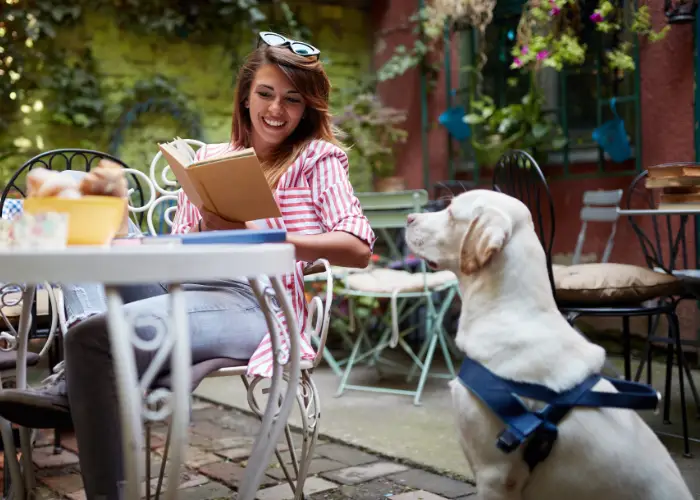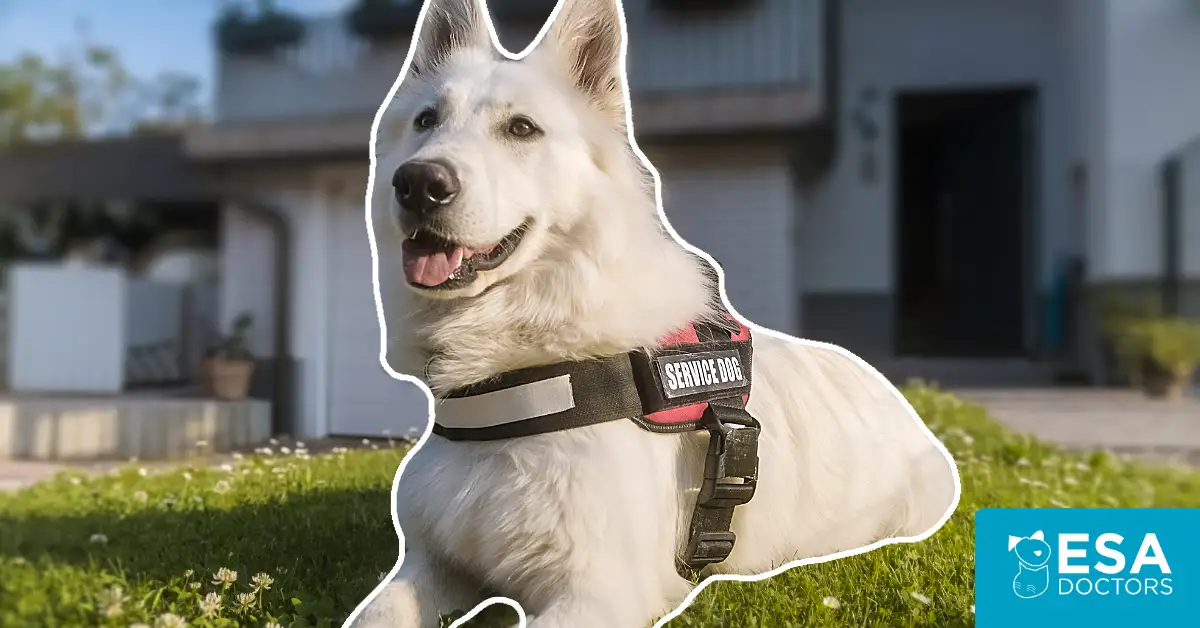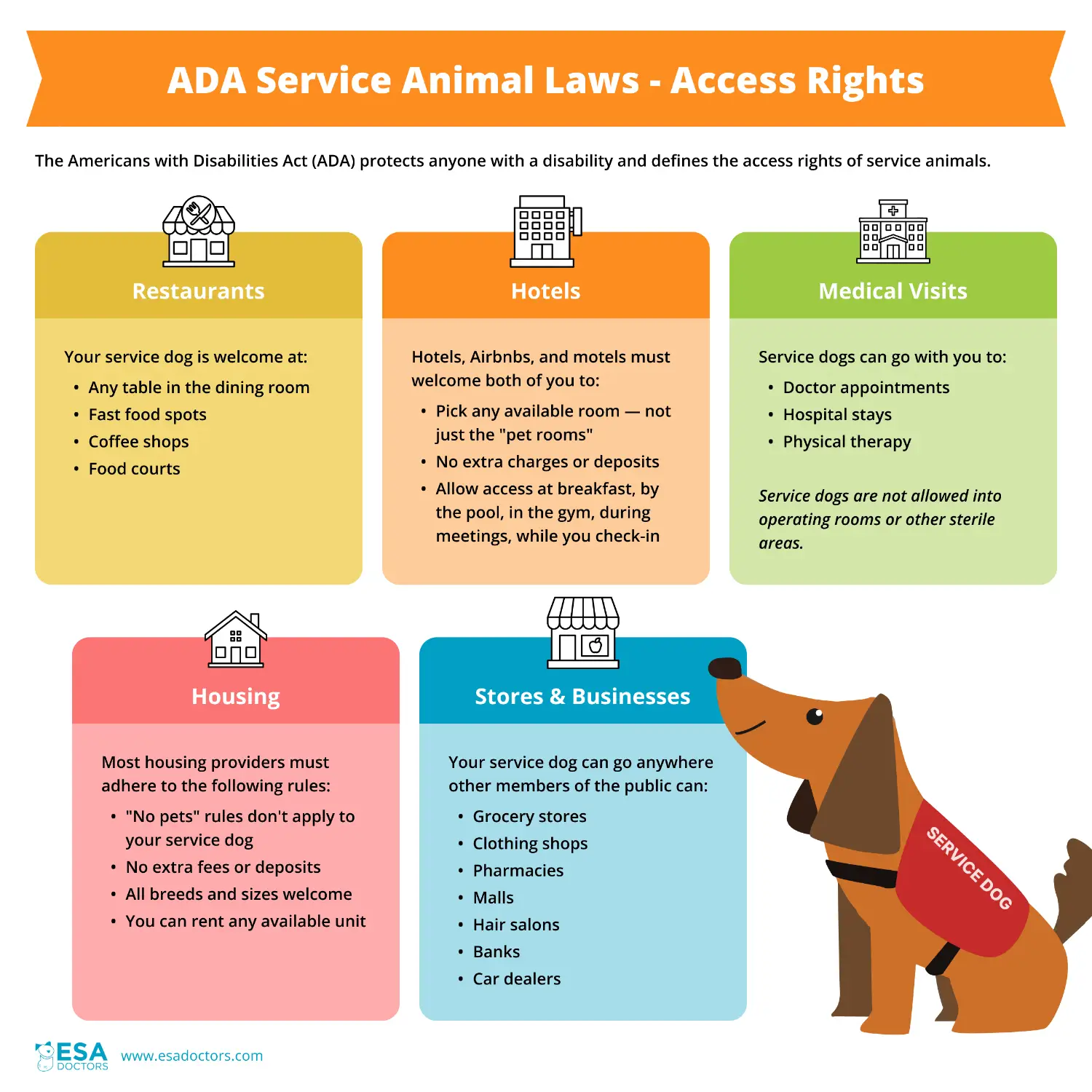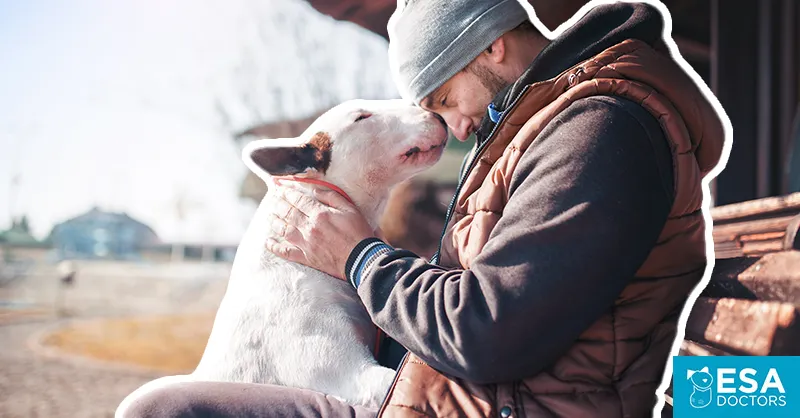The Americans with Disabilities Act (ADA) puts into law what should be common sense — everyone deserves equal access to public life. If you have a service dog, this means you can go anywhere together without hassle or extra costs. From grabbing lunch to catching a flight, staying at hotels, or shopping at the mall, your service dog has the right to be there with you, regardless of state.
The Department of Justice (DOJ) sets the rules everyone needs to follow about service dogs. They last updated these rules in 2010, spelling out how state and local governments (that’s Title II) and businesses open to the public (that’s Title III) should treat service dog teams. Let’s break down what these rules mean for you and your service animal in everyday life.
Who Does the ADA Protect?
The ADA protects anyone with a disability, meaning a health condition significantly impacting one or more major life activities. This includes people with:
- Physical disabilities (like mobility issues, blindness, or deafness)
- Chronic health conditions (like diabetes, epilepsy, or multiple sclerosis)
- Mental health disabilities (like PTSD, severe anxiety, depression, or bipolar disorder)
- Intellectual or developmental disabilities
You don’t need to have a visible disability to be protected. Many people with disabilities that aren’t apparent to others, such as psychiatric conditions or chronic illnesses, have the same rights to use service dogs. Service dogs used for mental health disabilities are called psychiatric service dogs.
The ADA does not protect owners of emotional support animals who have different legal rights under ESA laws.
ADA Service Dog Handler Rights
Your service dog helps you live your life. The ADA backs you up, making sure you can go about your day without hassle. Here’s what that means:
Restaurants
Food brings people together, and you shouldn’t miss out. Your service dog is welcome at:
- Any table in the dining room
- Fast food spots
- Coffee shops
- Food courts
Hotels
Need a place to stay? Any hotel, Airbnb, or motel must welcome both of you:
- Pick any available room — not just the “pet rooms”
- No extra charges or deposits
- Your dog can join you:
- At breakfast
- By the pool
- In the gym
- During meetings
- While you check-in
Medical Visits
Your service dog is part of your health care. They can come with you to:
- Doctor appointments
- Hospital stays
- Physical therapy
Service dogs are not allowed into operating rooms or other areas where a sterile environment is essential.
Stores and Businesses
Running errands? Your service dog can come anywhere other members of the public can go. That means in places like:
- Grocery stores
- Clothing shops
- Pharmacies
- Malls
- Hair salons
- Banks
- Car dealers
Finding an Apartment
Home is where both of you belong. That means:
- “No pets” rules don’t apply to your service dog
- No extra fees or deposits
- All breeds and sizes welcome
- You can rent any available unit
These aren’t special privileges — they’re your rights under the ADA, which applies to all 50 states. The more you know them, the easier it is to speak up if someone questions you. And trust us, most issues clear up quickly once people understand the law.
ADA Privacy Rights for Service Dog Owners
Keeping your health condition private is a right. The ADA has your back when it comes to keeping your personal information personal. There are only two questions someone can ask to confirm whether you have a service dog.
- “Is that a service dog for a disability?”
- “What tasks does your dog perform?”
That’s it. Really. No one can ask you:
- What your disability is
- To show medical papers like letters
- To prove your dog is trained
- To make your dog perform their tasks
- To show special ID cards
Business and General Public Obligations under the ADA
When it comes to service dogs, businesses and staff have pretty straightforward duties. They need to welcome service dogs into any space where customers usually go — even if they have a “no pets” policy. Staff can only ask those two questions we talked about earlier, and they can’t demand special papers or proof of training. They should treat you like any other customer – no stuck-in-the-corner seating at restaurants or “special” rooms at hotels. Extra fees or deposits? Not allowed.
As for other customers who might be afraid of dogs or have allergies, the business needs to find a way to keep everyone comfortable without pushing you and your service dog out. Sure, they can ask your dog to leave if they’re causing real trouble (like barking non-stop or not housebroken), but they can’t kick you out just because someone’s nervous around dogs or doesn’t like your dog’s breed. And here’s something people often forget — staff and other customers shouldn’t pet, feed, or distract your service dog. These dogs are working, and everyone needs to respect that.

ADA Violations
Violating the rights of a service dog handler under the ADA can result in major legal penalties. These are just a few examples of times the government has gone after offenders:
Workplace Violations
Papa Johns agreed to pay $175,000 to settle a case where they denied a worker with vision impairments the right to bring his service dog to work, even after initially telling him it wouldn’t be a problem. Beyond the payment, Papa Johns must now train their employees about the ADA, update their policies, and let the EEOC monitor their handling of discrimination complaints.
Restaurant and Bar Violations
In December 2022, a disabled veteran was forced to leave a bar in Lexington because she had her service dog with her. After she filed a complaint, the venue reached a settlement with the U.S. Attorney’s Office for violating the ADA. Under the settlement, the bar must create and post a service animal policy, train their staff about service dogs, pay the veteran $1,000 in damages, and pay a $500 fine to the government.
In another settlement, a diner in East Haven reached a settlement with the U.S. Attorney’s Office after they wrongly forced a customer with disabilities to remove their service dog. Under the settlement, the diner must put up “Service Animals Welcome” signs, create a proper service dog policy, and train their staff about what they can and can’t ask customers with service dogs. The diner worked with officials to fix these issues quickly, avoiding a lawsuit that could have led to more serious penalties.
Hotel Violation
Two hotels faced consequences for turning away veterans with service dogs — one made a veteran sleep in her car after refusing to honor her 4 AM reservation, while another demanded illegal documentation of a service dog. Both hotels had to change their ways through settlements with the Justice Department, agreeing to create service dog policies, train their staff, post these policies publicly, and pay damages to the veterans.
These cases highlight a common problem — despite the ADA’s clear rules about service dogs in hotels, veterans and others with disabilities still get turned away when trying to access basic services.
Need a PSD letter from a licensed therapist?
See if you have a qualifying disorder for a PSD in 3 easy steps.







How can I get a service dog license for my ‘ dog ‘ that has random seizures? He needs constant medication and supervision. I travel with him.